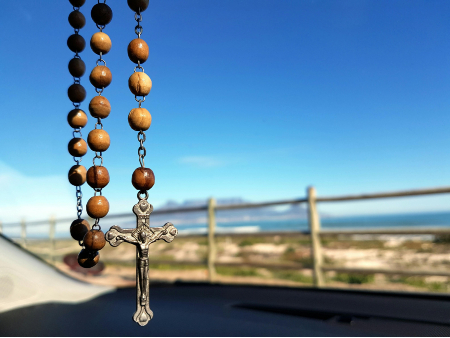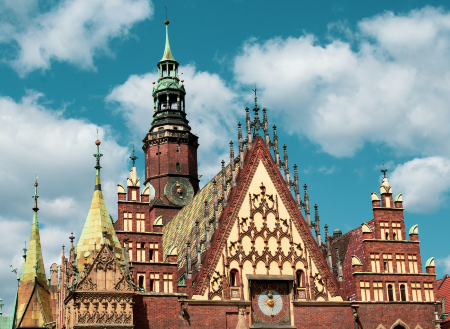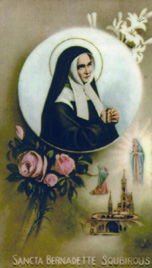We ask you, humbly: don't scroll away.
Hi readers, it seems you use Catholic Online a lot; that's great! It's a little awkward to ask, but we need your help. If you have already donated, we sincerely thank you. We're not salespeople, but we depend on donations averaging $14.76 and fewer than 1% of readers give. If you donate just $5.00, the price of your coffee, Catholic Online School could keep thriving. Thank you.Help Now >
Paul's Teaching on the Church - Pope Benedict XVI
FREE Catholic Classes
"We Who Are Many Are One Body"
VATICAN CITY, NOV. 23, 2006 (Zenit) - Here is a translation of the address Benedict XVI gave at Wednesday's general audience in St. Peter's Square. The address focused on the Apostle Paul, particularly his teaching on the Church.
* * *
Dear Brothers and Sisters,
We complete today our encounters with the Apostle Paul, dedicating a last reflection to him. We cannot take leave of him, in fact, without taking into consideration one of the decisive components of his activity and one of the most important themes of his thought: the reality of the Church.
We must note first of all that his first contact with the person of Jesus took place through the testimony of the Christian community of Jerusalem. It was a stormy contact. On knowing the new group of believers, he became immediately its fierce persecutor. He himself appropriately acknowledges it three times in as many letters: "I persecuted the Church of God," he writes (1 Corinthians 15:9; Galatians 1:13; Philippians 3:6), virtually presenting his behavior as the worst crime.
History shows us that one reaches Christ normally through the Church! In a certain sense, it is what happened, as we were saying, also to Paul, who found the Church before finding Jesus. In his case, however, this contact was counterproductive; it did not cause adherence, but rather a violent rejection.
For Paul, adherence to the Church was propitiated by a direct intervention of Christ, who, revealing himself to Paul on the way to Damascus, identified himself with the Church and made Paul understand that to persecute the Church was to persecute him, the Lord.
In fact, the Risen One said to Paul, the persecutor of the Church: "Saul, Saul, why do you persecute me? (Acts 9:4). In persecuting the Church, he was persecuting Christ. Paul converted then, at the same time, to Christ and to the Church.
Thus one understands why the Church was so present in the thoughts, in the heart and in the activity of Paul. In the first place, it was present as he literally founded many Churches in the different cities where he went as evangelizer. When he speaks of his "anxiety for all the Churches" (2 Corinthians 11:28), he is thinking of the various Christian communities established from time to time in Galatia, Ionia, Macedonia and Achaia.
Some of those Churches also gave him worries and displeasures, as happened for example with the Churches of Galatia, which he saw "turning to a different gospel (Galatians 1:6), something which he opposed with spirited determination. Nevertheless, he felt bound to the communities he founded not in a cold and bureaucratic manner, but intensely and passionately.
Thus, for example, he describes the Philippians as "my brethren, whom I love and long for, my joy and crown" (4:1). At other times he compares the different communities to a letter of recommendation unique of its kind: "You yourselves are our letter of recommendation, written in your hearts, to be known and read by all men" (2 Corinthians 3:2). At other times he shows them in their encounters a true and proper sentiment not only of paternity but even of maternity, as when he turns to those he is addressing beseeching them as "My little children, with whom I am again in travail until Christ be formed in you!" (Galatians 4:19; cf. also 1 Corinthians 4:14-15; 1 Thessalonians 2:7-8).
In his letters, Paul also illustrates for us his doctrine on the Church as such. Well known is his original definition of the Church as "body of Christ," which we do not find in other Christian authors of the first century (cf. 1 Corinthians 12:27; Ephesians 4:12; 5:30; Colossians 1:24). We find the most profound root of this amazing designation of the Church in the sacrament of the body of Christ.
St. Paul says: "Because there is one bread, we who are many are one body, for we all partake of the one bread" (1 Corinthians 10:17). In the Eucharist itself Christ gives us his body and makes us his body. In this connection, St. Paul says to the Galatians: "you are all one in Christ" (Galatians 3:28).
With all this Paul leads us to understand that not only is there a belonging of the Church to Christ, but also a certain form of equivalence and identification of the Church with Christ himself. It is from here, therefore, that the greatness and nobility of the Church derives, that is, of all of us who are part of it: Our being members of Christ, is almost as an extension of his personal presence in the world. And from here follows, naturally, our duty to really live in conformity with Christ.
From here derive also Paul's exhortations in regard to the several charisms which animate and structure the Christian community. They can all be referred back to a single source, which is the Spirit of the Father and the Son, knowing well that in the Church there is no one who is lacking them, because, as the Apostle writes, "To each is given the manifestation of the Spirit for the common good" (1 Corinthians 12:7).
What is important, however, is that all the charisms cooperate together for the building up of the community and that they not become instead a motive of laceration. To this end, Paul asks himself rhetorically: "Is Christ divided?" (1 Corinthians 1:13). He knows well and teaches us that it is necessary "to maintain the unity of the Spirit in the bond of peace. There is one body and one Spirit, just as you were called to the one hope that belongs to your call" (Ephesians 4:3-4).
Obviously, to underline the need for unity does not mean to hold that one must make ecclesial life uniform and flat according to one way of operating. Elsewhere Paul teaches "Do not quench the Spirit" (1 Thessalonians 5:19), namely, to generously make room for the unforeseeable dynamism of the charismatic manifestations of the Spirit, who is an always new source of energy and vitality.
But if there is a particularly important criterion for Paul it is mutual edification: "Let all things be done for edification" (1 Corinthians 14:26). Everything should concur to build the ecclesial fabric in an orderly way, not only without deadlocks, but also without flights or tears.
One of Paul's letters goes so far as to present the Church as the bride of Christ (cf. Ephesians 5:21-33). He thus takes up again a prophetic metaphor, which made of the people of Israel the spouse of God of the Covenant (cf. Hosea 2:4.21; Isaiah 54:5-8): He thus expresses to what point the relations are intimate between Christ and his Church, be it because she is the object of the most tender love on the part of her Lord, or because love must be mutual and we, in as much as members of the Church, must show him a passionate fidelity.
In conclusion, therefore, at stake is a relationship of communion: the relationship -- to call it in some way -- "vertical" between Jesus Christ and all of us, but also "horizontal" between all those who are distinguished in the world by the fact of "calling on the name of Jesus Christ, our Lord" (1 Corinthians 1:2).
This is our definition: We are part of those who call on the name of the Lord Jesus Christ. Thus we understand to what point we must desire the fulfillment of what Paul himself yearns for when writing to the Corinthians: "But if all prophesy, and an unbeliever or outsider enters, he is convicted by all, he is called to account by all, the secrets of his heart are disclosed, and so, falling on his face, he will worship God and declare that God is really among you" (1 Corinthians 14:24-25).
So should be our liturgical meetings. A non-Christian who enters one of our assemblies should be able to say at the end: "Truly God is with you." Let us ask the Lord that we might live in this way, in communion with Christ and in communion among ourselves.
[At the end of the Audience, the Holy Father greeted pilgrims in several languages. In English, he said:]
Dear Brothers and Sisters,
Continuing our reflections on the Apostle Paul, we now turn to his teaching on the Church. St. Paul's encounter with the risen Lord on the way to Damascus led him to understand that, in persecuting the Church, he was persecuting Christ himself. Paul was thus converted both to Christ and the Church. We can understand, then, why the Church plays so important a part in his thought and work.
Paul founded several Churches during his missionary journeys, and he demonstrated, through his letters and visits, a constant and lively "concern for all the Churches" (2 Corinthians 11:28). For Paul, the Church is truly the "Body of Christ," an extension, as it were, of the risen Lord's presence in the world, enlivened, structured and built up by the gifts of the Holy Spirit.
The Pauline image of the Church as the Bride of Christ (cf. Ephesians 5:21ff.) likewise stresses the relationship of fidelity and love uniting the Lord and all the members of his body. Through the prayers of St. Paul, may we enter ever more deeply into this mystery of communion, in order to testify more effectively to Christ's presence in our world.
 Hi readers, it seems you use Catholic Online a lot; that's great! It's a little awkward to ask, but we need your help. If you have already donated, we sincerely thank you. We're not salespeople, but we depend on donations averaging $14.76 and fewer than 1% of readers give. If you donate just $5.00, the price of your coffee, Catholic Online School could keep thriving. Thank you. Help Now >
Hi readers, it seems you use Catholic Online a lot; that's great! It's a little awkward to ask, but we need your help. If you have already donated, we sincerely thank you. We're not salespeople, but we depend on donations averaging $14.76 and fewer than 1% of readers give. If you donate just $5.00, the price of your coffee, Catholic Online School could keep thriving. Thank you. Help Now >
My prayerful greetings go to all the English-speaking visitors and pilgrims present in today's audience, including the groups from England, Malta, Japan and the United States of America. I greet especially the Salvatorian Sisters, the American Friends of the Vatican Library, and the delegation from the Association of the Order of Malta. May your visit to the city of the Apostles Peter and Paul renew your love for Christ and his Church, and may God's blessing be upon you all.
[Original text: English]
Contact
Catholic Online
https://www.catholic.org
CA, US
Catholic Online - Publisher, 661 869-1000
info@yourcatholicvoice.org
Keywords
Paul, Life, Pope Benedict, Apostle, One Body
More Catholic PRWire
Showing 1 - 50 of 4,716
A Recession Antidote
Randy Hain
Monaco & The Vatican: Monaco's Grace Kelly Exhibit to Rome--A Review of Monegasque-Holy See Diplomatic History
Dna. Maria St. Catherine Sharpe, t.o.s.m., T.O.SS.T.
The Why of Jesus' Death: A Pauline Perspective
Jerom Paul
A Royal Betrayal: Catholic Monaco Liberalizes Abortion
Dna. Maria St.Catherine De Grace Sharpe, t.o.s.m., T.O.SS.T.
Embrace every moment as sacred time
Mary Regina Morrell
My Dad
JoMarie Grinkiewicz
Letting go is simple wisdom with divine potential
Mary Regina Morrell
Father Lombardi's Address on Catholic Media
Catholic Online
Pope's Words to Pontifical Latin American College
Catholic Online
Prelate: Genetics Needs a Conscience
Catholic Online
State Aid for Catholic Schools: Help or Hindrance?
Catholic Online
Scorsese Planning Movie on Japanese Martyrs
Catholic Online
2 Nuns Kidnapped in Kenya Set Free
Catholic Online
Holy See-Israel Negotiation Moves Forward
Catholic Online
Franchising to Evangelize
Catholic Online
Catholics Decry Anti-Christianity in Israel
Catholic Online
Pope and Gordon Brown Meet About Development Aid
Catholic Online
Pontiff Backs Latin America's Continental Mission
Catholic Online
Cardinal Warns Against Anti-Catholic Education
Catholic Online
Full Circle
Robert Gieb
We ask you, humbly: don't scroll away.
Hi readers, it seems you use Catholic Online a lot; that's great! It's a little awkward to ask, but we need your help. If you have already donated, we sincerely thank you. We're not salespeople, but we depend on donations averaging $14.76 and fewer than 1% of readers give. If you donate just $5.00, the price of your coffee, Catholic Online School could keep thriving. Thank you.Help Now >
Three words to a deeper faith
Paul Sposite
Relections for Lent 2009
chris anthony
Wisdom lies beyond the surface of life
Mary Regina Morrell
World Food Program Director on Lent
Catholic Online
Moral Clarity
DAN SHEA
Pope's Lenten Message for 2009
Catholic Online
A Prayer for Monaco: Remembering the Faith Legacy of Prince Rainier III & Princess Grace and Contemplating the Moral Challenges of Prince Albert II
Dna. Maria St. Catherine Sharpe
Keeping a Lid on Permissiveness
Sally Connolly
Glimpse of Me
Sarah Reinhard
The 3 stages of life
Michele Szekely
Sex and the Married Woman
Cheryl Dickow
A Catholic Woman Returns to the Church
Cheryl Dickow
Modernity & Morality
Dan Shea
Just a Minute
Sarah Reinhard
Catholic identity ... triumphant reemergence!
Hugh McNichol
Edging God Out
Paul Sposite
Burying a St. Joseph Statue
Cheryl Dickow
George Bush Speaks on Papal Visit
Catholic Online
Sometimes moving forward means moving the canoe
Mary Regina Morrell
Action Changes Things: Teaching our Kids about Community Service
Lisa Hendey
We ask you, humbly: don't scroll away.
Hi readers, it seems you use Catholic Online a lot; that's great! It's a little awkward to ask, but we need your help. If you have already donated, we sincerely thank you. We're not salespeople, but we depend on donations averaging $14.76 and fewer than 1% of readers give. If you donate just $5.00, the price of your coffee, Catholic Online School could keep thriving. Thank you.Help Now >
Easter... A Way of Life
Paul Spoisite
Papal initiative...peace and harmony!
Hugh McNichol
Proclaim the mysteries of the Resurrection!
Hugh McNichol
Jerusalem Patriarch's Easter Message
Catholic Online
Good Friday Sermon of Father Cantalamessa
Catholic Online
Papal Address at the End of the Way of the Cross
Catholic Online
Cardinal Zen's Meditations for Via Crucis
Catholic Online
Interview With Vatican Aide on Jewish-Catholic Relations
Catholic Online
Pope Benedict XVI On the Easter Triduum
Catholic Online
Holy Saturday...anticipation!
Hugh McNichol










 Daily Readings for Tuesday, April 16, 2024
Daily Readings for Tuesday, April 16, 2024 St. Bernadette: Saint of the Day for Tuesday, April 16, 2024
St. Bernadette: Saint of the Day for Tuesday, April 16, 2024 Prayer for our Family #1: Prayer of the Day for Tuesday, April 16, 2024
Prayer for our Family #1: Prayer of the Day for Tuesday, April 16, 2024

